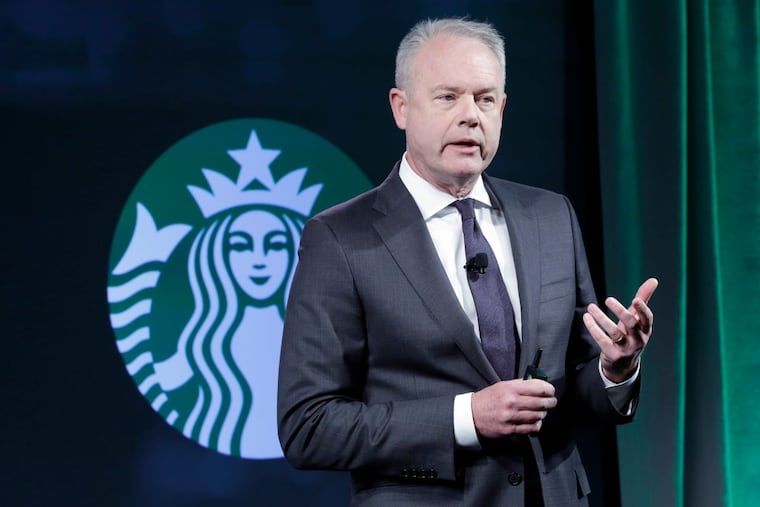Is Starbucks closing for a day really going to fix racial bias? | Opinion
As corporate diversity and inclusion leadership trainer for Fortune 500 companies, I hope corporations can use this shameful incident to focus on the solutions to this age-old problem of allowing racial stereotypes to inform how we treat people who are different from us.

Starbucks announced Tuesday that it will close all 8,000 of its U.S. coffee shops for an afternoon of corporate training on racial bias.
This announcement follows a national firestorm last weekend after two black men were arrested at the Starbucks at 18th and Spruce Streets. The two men, who witnesses say were quietly waiting for an acquaintance at the location, sat in the Starbucks and were identified by the store manager as "trespassers." After the manager called the police to have them removed, the men were handcuffed and arrested. In the wake of the incident, Starbucks says the manager, who is white, has left that store, pending an investigation.
As a corporate diversity and inclusion leadership trainer for Fortune 500 companies, I hope corporations can use this shameful incident to focus on the solutions to this age-old problem of allowing racial stereotypes to inform how we treat people who are different from us.
What corporations and individuals often miss about racial bias — both conscious and unconscious — is that there are two victims: the target of the racism, and the ignorant purveyor of the racist action.
Starbucks' announcement about training is a good start in repairing the disgraceful culture of bias. I hope that instead of firing the manager, Starbucks chooses to educate her on why what she did was wrong, and challenge all of its managers to embark on mandatory community service in the diverse communities they serve. But training alone, on one day, is not enough to truly change anything.
Racism is deeply embedded in the American DNA and consciousness. It's in the subtle things we do and say to people that can be the most damaging, the day-to-day interactions where we unconsciously hold people to different standards and treat them differently, based on race, class, or gender.
If Starbucks wants to fix their clear bias problem, it's not about mandatory training. It starts with conversations. It starts with honesty. White people must stop telling black people that what we tell you happens to us does not. It is disrespectful, and it is damaging. We all must learn to listen to one another — listen, keep our mouths shut, and hear one another.
And that is where we must start the hard work, of not just training people but of changing their hearts. Starbucks is right to call for mandatory classes on bias training. But that alone will not change people's hearts.
I suggest that Starbucks, and all companies that deal with issues of racial bias, take the following additional steps:
1. Instead of trying to mandate conduct, teach your workforce annually about the history of race in America. Bring in thought leaders, diverse educators, and people who can share information on the American context around race. The saying about those who cannot learn from history are doomed to repeat it is true. Education shifts behavior.
2. Create master classes with corporate leaders and the workforce to share their human stories via videos, conferences, or retreats. Our personal stories are what connect us as people. We get to pull down our walls and share the things that unite us.
3. Focus on inclusion more than just diversity. People need a seat at the table. Not just to be in the room. It's not just about hiring more employees of color; it's about including them in conversations about how the company functions on a day-to-day basis.
4. Customer-service representatives are a company's first line of engagement with the public. Create quarterly opportunities for them to interact with communities of color, LGBTQ, and women. Help your customer-service representatives understand what a real threat is vs. racial profiling. Only after they've mastered this difference should you allow them to interact with your customers.
5. Engage your white managers and executives in training that educates them on the unique barriers that people of color face when it comes to recruitment, retention, and advancement. They must understand that just hiring people and setting goals are not enough. People of color need opportunities to thrive and advance. White women leaders must also understand and advocate for women of color, not just "women" in the workforce, as our experiences are very different.
6. Financially incentivize and reward those teams, divisions, and leaders who increase their number of minority and female recruits, and penalize those who do not hire women or minorities and advance them. People are motivated by money. Use it as a tool for good.
Sophia A. Nelson is an award-winning corporate diversity champion and author of the award-winning book "Black Woman Redefined: Dispelling Myths and Discovering Fulfillment in the Age of Michelle Obama."